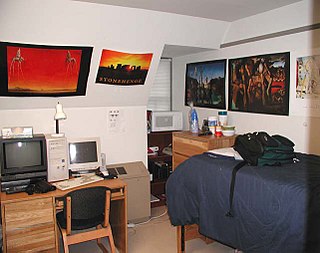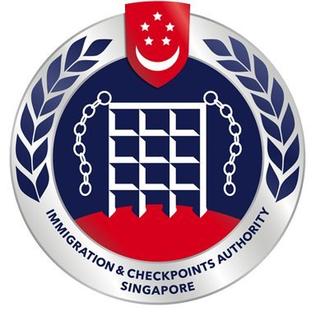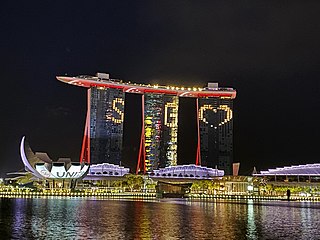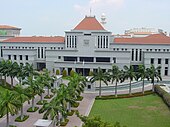
Sellapan Ramanathan, often known as S. R. Nathan, was a Singaporean politician and civil servant who served as the sixth president of Singapore between 1999 and 2011. Nathan won both the 1999 presidential election and the 2005 presidential election thanks to an uncontested walkover due to ineligible candidates. He was the longest-serving president in Singapore's history and the only to serve two full terms.

A dormitory, also known as a hall of residence or a residence hall, is a building primarily providing sleeping and residential quarters for large numbers of people such as boarding school, high school, college or university students. In some countries, it can also refer to a room containing several beds accommodating people.

Lee Hsien Loong is a Singaporean politician and former brigadier-general who has been serving as the third Prime Minister of Singapore and Secretary-General of the People's Action Party since 2004. He has been the Member of Parliament (MP) for the Teck Ghee division of Ang Mo Kio GRC since 1991, and previously Teck Ghee SMC between 1984 and 1991.

The Mass Rapid Transit system, locally known by the initialism MRT, is a rapid transit system in Singapore and the island country's principal mode of railway transportation. The system commenced operations in November 1987 after two decades of planning with an initial 6 km (3.7 mi) stretch consisting of five stations. The network has since grown to span the length and breadth of the country's main island – with the exception of the forested core and the rural northwestern region – in accordance with Singapore's aim of developing a comprehensive rail network as the backbone of the country's public transportation system, averaging a daily ridership of 3.4 million in 2019.

The East–West Line (EWL) is a high-capacity Mass Rapid Transit (MRT) line operated by SMRT in Singapore, running from Pasir Ris station in the east to Tuas Link station in the west, with an additional branch between Changi Airport and Tanah Merah stations. It is the second Mass Rapid Transit line to be built in Singapore. Coloured green on the rail map, the line serves 35 stations, 8 of which are underground. At 57.2 kilometres (35.5 mi), the line is the longest on the MRT network.

The Republic of Singapore Navy (RSN) is the maritime service branch of the Singapore Armed Forces (SAF) responsible for defending the country against any seaborne threats and as a guarantor of its sea lines of communications. The RSN traces its origins to the Royal Navy when Singapore was still a crown colony of the British Empire. The service was formally established in 1967, two years after its independence from Malaysia in 1965, and had undergone a substantial modernisation ever since – which has led them into becoming the most powerful navy in Southeast Asia.

The Oregon Liquor and Cannabis Commission (OLCC), formerly known as the Oregon Liquor Control Commission, is a government agency of the U.S. state of Oregon. The OLCC was created by an act of the Oregon Legislative Assembly in 1933, days after the repeal of prohibition, as a means of providing control over the distribution, sales and consumption of alcoholic beverages. To this end, the agency was given the authority to regulate and license those who manufacture, sell or serve alcohol. Oregon is one of 18 alcoholic beverage control states that directly control the sales of alcoholic beverages in the United States. In 2014, the passage of Oregon Ballot Measure 91 (2014) legalized the recreational use of marijuana in Oregon and gave regulatory authority to the OLCC.
Pulau Semakau is located to the south of the main island of Singapore, off the Straits of Singapore. The Semakau Landfill is located on the eastern side of the island, and was created by the amalgamation of Pulau Sakeng, and "anchored" to Pulau Semakau. The Semakau Landfill is Singapore's first offshore landfill and now the only remaining landfill in Singapore.

Human rights in Singapore refers to rights both legal and in practice. Since Singapore's independence in 1965, the legal rights of its citizens have been set out in the Constitution of Singapore and include rights found in subsequent amendments and referendums. These rights have evolved through Singapore's history as a part of the Straits Settlements, its years under Japanese occupation, its position as a separate self-governing crown colony, and its present day status as a sovereign island country and city-state.

The Immigration and Checkpoints Authority (ICA) is a law enforcement agency within the Ministry of Home Affairs (MHA), the border control agency responsible for frontline border control operations at air, sea and rail ports in Singapore.
Crime rates in Singapore are some of the lowest in the world, with petty crimes such as pickpocketing and street theft rarely occurring, and violent crime being extremely rare. Penalties for drug offences such as trafficking in Singapore are severe, and include the death penalty.

Gul Circle MRT station is an elevated Mass Rapid Transit (MRT) station on the East West line (EWL). Located in Tuas, western Singapore, the station serves the surrounding industries of JTC Space @ Tuas and Mapletree Pioneer Logistic Hub. The station is operated by SMRT Trains.

Tuas Link MRT station is an elevated Mass Rapid Transit (MRT) station in western Singapore. Located in Tuas along Tuas West Drive, it is located close to Tuas Depot and Tuas Checkpoint. The station is the terminus of the East–West line (EWL) and the westernmost station in Singapore.
The 2013 Little India riot took place on 8 December 2013 after a fatal accident occurred at SST 21:23 at the junction of Race Course Road and Hampshire Road in Little India, Singapore, causing angry mobs of migrant labourers from South Asia to attack the bus involved and emergency vehicles that had by then arrived at the location. About 300 migrant labourers were involved in the riot which lasted for around two hours. This was the second riot in post-independence Singapore, and the first in 44 years since the 1969 race riots. The riots led to stricter laws and higher penalties on alcohol consumption and sales, culminating in the Liquor Control Act in 2015.
Employment in Singapore, including the development and planning of Singapore workforce to achieve "globally competitive workforce in a sustainable manner," is managed under the jurisdiction of Ministry of Manpower. Other aspects of employment related functions as International Talent Promotion, Labour Relations, Management of Foreign Manpower, Labour Welfare and Services, are also covered by the ministry.

The Prevention of Human Trafficking Act 2015 (PHTA) is a statute of the Parliament of Singapore that criminalizes Trafficking-In-Persons (TIP) especially vulnerable individuals. The law is designed specifically to make acts of knowingly receiving payment in connection with the exploitation of a trafficked victim a criminal offence.

The Liquor Control Act 2015 is a statute of the Parliament of Singapore that regulates the supply and consumption of liquor at public places, and to make consequential and related amendments to certain other written laws. The law is designed specifically to deter recurrences of the 2013 Little India riot that took place with mobs under the influence of alcohol.

The COVID-19 pandemic in Singapore was a part of the worldwide pandemic of coronavirus disease 2019 caused by severe acute respiratory syndrome coronavirus 2. The first case in Singapore was confirmed on 23 January 2020. Early cases were primarily imported until local transmission began to develop in February and March. In late March and April, COVID-19 clusters were detected at multiple migrant worker dormitories, which soon contributed to an overwhelming proportion of new cases in the country.
The following lists events that happened during 2021 in the Republic of Singapore.
The following is a timeline of the COVID-19 pandemic in Singapore in 2020.














